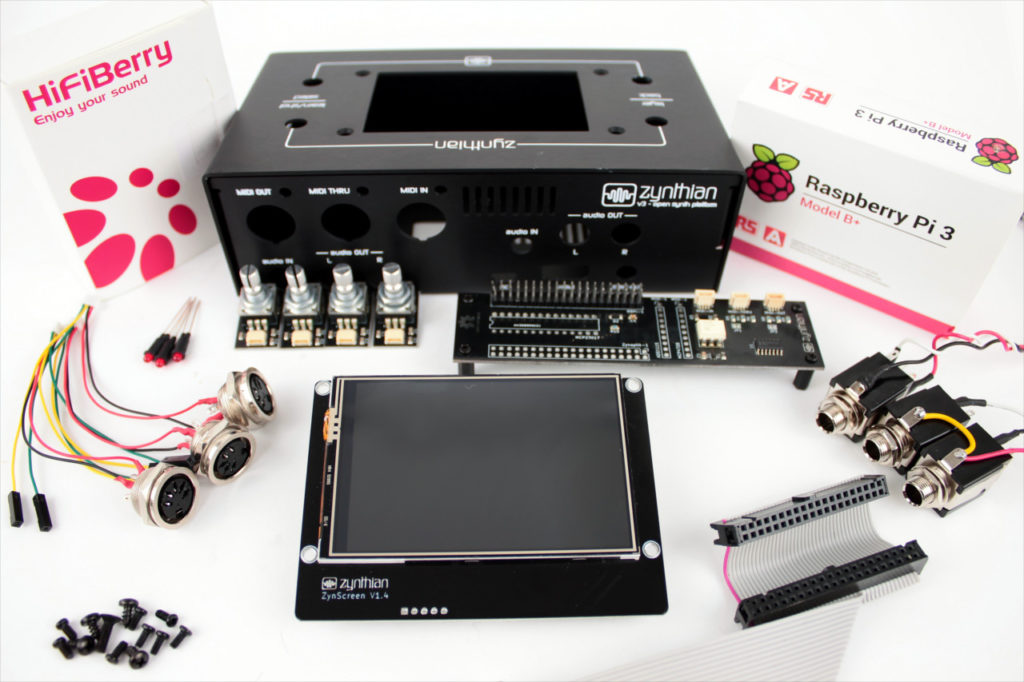Just plug the wires and tighten the screws!

I’m really proud to present the new Kit V3, a big step forward for the Zynthian project because of several reasons:
- Pre-built: It’s completely pre-built using SMD technology, so you don’t need to solder anything. Just plug the wires and tighten the screws.
- Zynscreen: The new official display has been specially designed for zynthian and integrates the controller interface, what simplify the assembling process.
- Zynaptik: The new zynaptik circuit integrates the 3 standard MIDI ports (IN/OUT/THRU) and some new optional features.
- Audio Input: The Hifiberry DAC+ ADC is the new official soundcard and integrates audio input, allowing to use zynthian as a powerful FX processor or stompbox.
We have a dream. We want to empower musicians with upgradable and easy-to-maintain machines that can be used on stage and studio. Open machines that can be used for “normal” tasks, as playing and composing, but also can be extended and hacked for going beyond that, for exploring new spaces.
Reducing the skill level required for building a Zynthian Box has been one of the project’s main goals from the beginning. We want more non-tech-skilled musicians playing with Zynthian Boxes around the world, and this implies offering super-easy-to-mount kits at the lowest price.
With the new Kit V3, building a Zynthian Box is easier than ever, and we have tried to keep prices as low as possible. That makes zynthian accessible to more people, more musicians and makers.
Until now, pre-built kits were soldered by hand, a time-consuming task that increased the price of this kind of kits, but V3 is changing this.
We have re-designed the zynthian specific circuits and manufactured using SMD technology. On-board connectors size has been reduced (JST-SH), allowing thinner wires. Case connectors have been assembled with the corresponding wiring harnesses. Activity LED’s are connected using Dupont connectors. You don’t need to solder anything and assembling it is so easy that your grandma could do it for you!!
And we have a new official display, specially designed and manufactured for zynthian with the help of OzzMaker. Besides integrating the controller interface, what improves wiring and simplify the assembling process, the Zynscreen also includes the SW1 row-pin connector what allows adding customized functions like a “panic button” or a “sustain pedal”.
The new zynaptik circuit, that replaces the veteran AllInOne circuit, improves the MIDI standard ports, increasing MIDI compliance and fixing the problems with activity LEDs. Also includes new optional (not soldered) features that will simplify the use of zynthian with modular synthesizers (CV/gate signals) or in interactive installations:
- 16 digital I/O ports (extra MCP23017)
- 4/8 analog inputs (up to 2 x ADS1115 modules)
- 4/8 analog outputs (up to 2 x MCP4728 modules)
And finally, although audio input was officially introduced in the kit v2+, only one month ago, it was initially planned for v3, so it could be considered as a new feature. Of course, the v3’s soundcard is the same Hifiberry DAC+ ADC used by the kit v2+. You can read the details on this post.
Audio input opens a wide door to new applications and use cases: Using zynthian as a powerful FX processor or stompbox. You can create simple FX chains using the native zynthian UI or the most bizarre and intrincated pedalboards with the amazing MOD-UI web interface.
- Buy your Zynthian Kit v3
- Official Guide: Assembling Tutorial Kit v3
- German Tutorial by Sollmaker: Meine Version des Zynthian Synthesizer – DIY
Enjoy!

I curious about the capabilities of this device as an fx unit. It seems suited to synth artists, where most other units are built for guitarist and lack real playability. They are meant to be set for use, rather than to be played. I disdain simple static devices lacking playability. Is this device capable, or typical?
For using Zynthian as FX processor, RBPi-3 is perfectly OK. Also it’s OK for using Zynthian as a Synth unit for most of use-cases.
Be nice to see the original zynthian prototypes and a picture index of the different versions. . . .